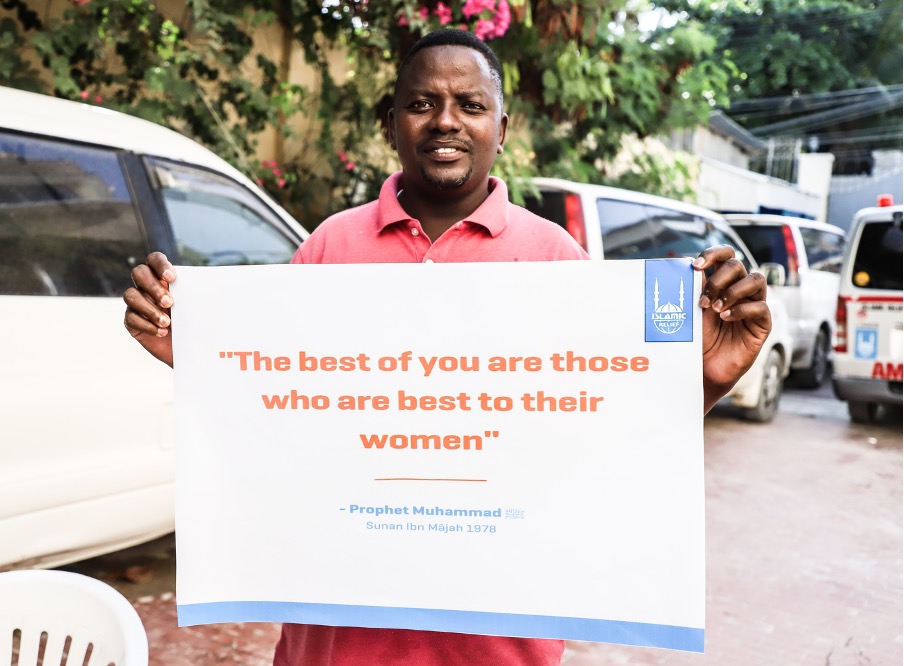
From the bustling urban markets of Baidoa to the surrounding arid plains, Milgo Keinan’s job with Islamic Relief is to keep women, children, and other vulnerable people in Somalia safe from harm. Part of that job, she says, is working to get the whole community behind her mission – men as well as women.
The job title for my role with Islamic Relief is ‘Protection and Inclusion Officer’, but for me it is about more than protection and inclusion, and it is more than just a job. I see it as a calling that resonates with the very core of my being.
I work with and for the most vulnerable people in our society; women and children, especially those who have been driven from their homes by drought or conflict. I am determined to work tirelessly not just to protect them but also to empower them to reach their full potential.
Rebuilding shattered lives in Baidoa’s camps
The camps in Baidoa are home to thousands of displaced people and have many tales to tell, heartbreaking and heartwarming stories of loss and recovery. Above all, after suffering so much, the families who live here just want a return to normality. Amid makeshift shelters and with limited resources, they are striving to piece together their shattered lives, lives torn apart by relentless conflict and years of severe drought.
Witnessing the breadth of human emotion and the indomitable human spirit is part of the daily reality in these camps. It was here that I first met Mariam, a beacon of resilience and courage in the face of adversity. Her experience of devastating drought and frightening conflict is all too common in Somalia, but she has a quiet tenacity about her that I see in so many women in my country.
Mariam’s story: a testimony to strength
Before the failure of successive rainy seasons in a searing drought, Mariam was 1 of the farmers growing the crops that sustained her community. Those crops failed when the rains failed, and she was compelled to leave her land in a desperate search for food and water.
Displaced women on the move are particularly vulnerable to attack and abuse. Even a seemingly mundane task like collecting firewood can leave them dangerously exposed. Mariam’s journey to Baidoa was perilous, and it is only in the relative sanctuary of the camps that her path to survival can begin to take shape.
The first time I met Mariam, her eyes told a story of deep sorrow. There was a glimmer of hope there, too, but the ordeal she described was heartbreaking.
It is women and children who suffer most when conflict and climate change force families to leave their homes and land. “Hunger does not allow you to weigh dangers,” Mariam told me.
Islamic Relief’s mission: Empowerment through action
My experiences with Islamic Relief have shown me the multifaceted nature of our mission. We respond to immediate crises, but while doing so we are also doing the important groundwork that is needed to deliver lasting safety and self-reliance in the communities we serve.
Creating a secure environment for women and children, providing psychological support, and encouraging economic independence and justice are the cornerstones of our approach. Mariam’s testimony of finding direction and community through our interventions is a strong affirmation of our positive impact.
Community engagement as a catalyst for change
We recognise that you need to involve the entire community to achieve lasting change – including both women and men and marginalised groups. We organise men-only awareness sessions, for example, to challenge and change cultural norms, inspiring men to share in leading the fight against gender-based violence (GBV) and harmful practices such as female genital mutilation/cutting (FGM/C).

Education is our most potent tool, empowering both women and men. Knowledge imparts power – power to change the future for the whole community. Every woman who learns her rights and resolves to shield her daughters from FGM/C, every older man who preaches against such practices, they all add to the profound shifts that can occur within communities.
Each change of opinion may be small in itself, but they can all add up to a powerful wave of transformation. The awakening of a community to its own potential for protection, respect, and rebuilding is a significant stride toward progress.
Our collective duty to free women from fear
Despite the advances we have achieved, the situation for many Somali women and children remains critical.
The path ahead is going to be a long one when so many women are still subjected to sexual violence. Our vision is to build a Somalia where women like Mariam can perform simple tasks without fear of sexual assault, and where children are spared from the traumas of war.
A call to action during the 16 Days of Activism campaign
The annual United Nations-led 16 Days of Activism against Gender-based Violence campaign is a time for us all to turn resolve into action. The organisers are challenging us to unite in investing significantly to prevent violence against women and girls. We need to unite in raising awareness, in community education, and in providing practical support to survivors.
We invite you to join Islamic Relief’s mission to protect and empower women at risk of violence in Somalia. Please donate now and help us transform lives and heal communities.
BROWSE OTHER OPINIONS
FEATURED OPINIONS
- COP27: What we have been doing
- Pakistan’s summer of calamity shows climate change is no longer a threat – it’s a reality
- I still can’t believe I’m alive – but I’m afraid Gaza may face this fear and heartbreak again
- Self-isolation in Gaza: Coping with Covid-19
- What it’s like to be a humanitarian worker on the Covid-19 frontline in Pakistan
MOST POPULAR TOPIC
View More









